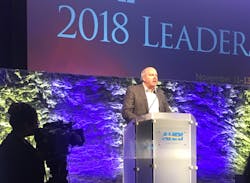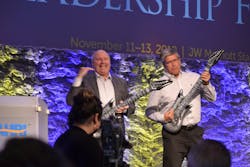Incoming AHRI Chairman Bill Steel: Product 'Sectors' Will Bring a More Inclusive Process
Incoming Air Conditioning, Heating and Refrigeration Institute Chairman Bill Steel, President and CEO of Bard Manufacturing Co., began his keynote address to attendees at the 2018 AHRI Leadership Forum by acknowledging that Bard Manufacturing is one of those HVACR manufacturers that perhaps not many have heard about.
"It's one of those companies that people often have to 'Google,' to find out what a 'Bard Manufacturing' is," Steel said, drawing a laugh from the hundreds in attendance at the recent meeting in Tucson, Ariz.
In truth, however, Bard is entering its 105th year as a manufacturer of precision climate control equipment for the classroom, telecommunications, equipment cooling, commercial building and niche residential markets. The company operates out of three facilities in Bryan, Oh.; Madison, Ga.; and Saltillo, Mexico. Bard is a fourth-generation family-owned manufacturing business.
That bit of self-deprecating humor helped Steel emphasize a major point of this inaugural address: that the modification of AHRI product sections to become more inclusive product "sectors," will offer all companies, both large and small, a voice in the AHRI decision-making process.
"The new industry sector process will lead to a more efficient, productive and inclusive AHRI," Steel affirmed.
"If you currently participate in a product section, engineering committee or compliance committee, rest assured that even though they won’t have the same names, that function will still exist. We will always need standards developed and revised, we will always need to administer certification programs, and despite President Trump’s best efforts, we will always have regulations that need to be commented on," Steel said.
Steel explained that under the new arrangement, product sectors will meet as task forces whenever the need arises, complete the work required, and then disband until the need for another meeting arises again.
"This not only leads to a more efficient process, but it’s also designed to be a more inclusive process," Steel said. "That’s because, with the way things are currently done, unless you are already a member of a particular standards, certification or regulatory committee, you can’t participate in that activity. In the new AHRI, you can participate. The same important activities will be handled by newly-formed task forces that will be open to all members who have a proverbial 'dog in the fight.' This will allow the group to reach out to all members whose expertise could be helpful to the cause."
Steel admitted that, despite the great amount of time and effort devoted to "reinventing" AHRI, he and others in AHRI leadership will need time to iron out a few wrinkles in the new arrangement.
"There will undoubtedly be things that will need to be tweaked going forward, so we ask two things of AHRI members: one, keep an open mind and positive demeanor. And two, absolutely communicate what you think is working and what you think needs to be revised. The current structure evolved over more than 50 years, and this one will evolve as well. So remember: change is difficult, but not changing is fatal," he said.
Steel added that the current U.S. economic environment is very favorable to HVACR manufacturing, which is an ideal time to focus on innovation and leadership.
"Across the board, industry statistics have improved over the past year. Shipments are up, the economy is booming, and taxes are down," he said, while also acknowledging that regulations will continue to present a challenge to manufacturers.
"The beauty of [AHRI] is that we compete with each other fiercely in the marketplace which makes us all better, but we are united in our commitment of providing our customers with the best, most innovative and most energy-efficient equipment that meets their economic needs. Most consumers understand that comfort, safety and security don’t come about without consuming energy and resources. But it’s a trade-off they’re willing to make," Steel said, and he added that HVACR manufacturers are committed to both the production of energy efficient products, while taking care to minimize impact.
"Minimizing our impact is what we should be about, and it is what we are about, and we should tell that story every chance we get," Steel said. "'We Make Life Better' is so much more than an AHRI tagline. It’s the reality of what we do for people all over the globe, every day, and you all play a critical role in that."
Government Involvement
Steel urged AHRI members to seek out AHRI's help in setting up meetings with elected representatives. He said that help is there for all companies, big and small.
"Eighty-five percent of AHRI companies are classified as 'small' or 'medium' size companies," Steel said. "The majority of us will never have a marketing budget big enough to run a Super Bowl TV ad, probably can’t afford a full-time government affairs representative, and wouldn’t know a California state senator if one walked in the door. And that's where AHRI comes in: to provide the perfect outlet to help you and your company become active in federal and state regulatory and legislative affairs. Team up with AHRI, so they can help you find your legislative and regulatory voice."
Steel urged attendees to make time in 2019 to arrange a visit with elected officials at all levels — mayors, governors, senators, congressmen and congresswomen — "to show them what you do, the challenges you face, and the good things your company does for your community."
One of the largest trade associations in the nation, AHRI represents more than 300 HVACR industry member companies across the globe, with its membership accounting for more than 90 percent of the residential and commercial HVACR equipment manufactured and sold in North America. It is estimated over 1.3 million people are employed in the manufacturing, distribution, installation and maintenance of HVACR and water heating products, and the annual economic activity resulting from HVACR and water heating related manufacturing amounts to $256 billion.
About the Author
TERRY MCIVER
Content Director - CB
A career publishing professional, Terence 'Terry' McIver has served three diverse industry publications in varying degrees of responsibility since 1987, and has also worked in marketing communications for a major U.S. corporation.
He joined the staff of Contracting Business magazine in April 2005.
As director of content for Contracting Business, he produces daily content and feature articles for CB's 36,000 print subscribers and many more Internet visitors. He has written hundreds of news, features and contractor profile articles for CB's audience of quality HVACR contractors. He can also be found on the road, covering HVACR industry events or visiting with manufacturers or contractors. He also has significant experience in trade show planning.
Each year, Terry plays a major role in the planning and hosting of the Contracting Business "Refrigeration Roundtable," a private, idea-sharing meeting that brings together supermarket contractors and refrigeration contractors.


